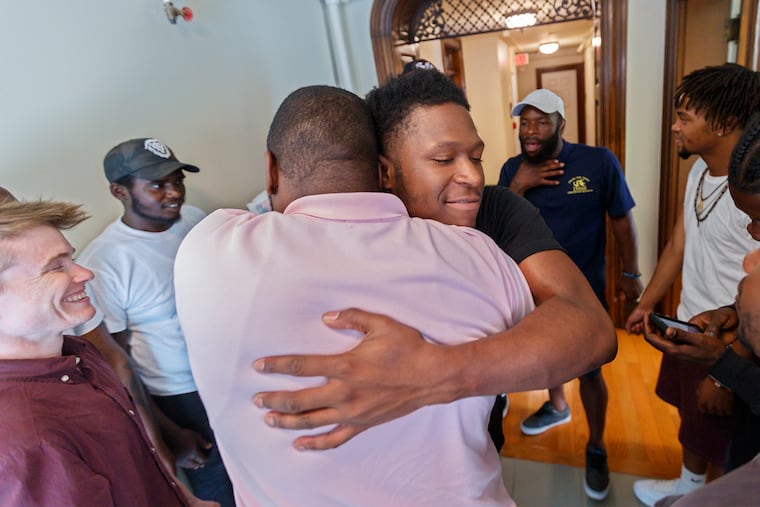The Game Changers, a group of young trauma survivors, heal themselves to help others | Mike Newall
Young men of color in Philadelphia risk trauma more than most. But the people helping them don't look like them.

It had been a very long time since anyone told Nasir Lee that they respected him. A deeper kind of respect. Not the kind that is more like fear. Nasir, 20, had earned plenty of that on the streets of the Strawberry Mansion neighborhood where he grew up.
Thick-shouldered and reserved, almost guarded, but always polite, Nasir was the youngest and quietest member of the Community Health Worker Peer Project, a group of young black and Hispanic men who have suffered great trauma and who are now learning, in a course at Drexel University, to recognize and treat trauma in others.
I attended the graduation of the previous class last year, who gave themselves a name: the Healers. They went on to work as peer specialists and community health-care workers. Sometimes, they are sent to a gunshot victim’s bedside to help them through their trauma. Others help navigate the maze of the behavioral health and health-care systems.
Too often, said Casey Chanton, a project manager at Drexel, those positions aren’t filled by young men of color, much less young men who have been through the kind of trauma their clients see. The peer project hopes to change that.
Meeting the Healers was such a powerful experience that I wanted to follow the next class — the third in as many years — who have decided to be called the Game Changers. (“The game is designed for us to lose,” said Michael Luna, 30, one of the class members. “We chose the Game Changers because we’re going to change that narrative.”) And that’s where I met Nasir, back in May, who was only just allowing himself to open up to his classmates.
This week, he was set for his Circle of Respect — a weekly tradition where the Game Changers lock arms and tell one of their classmates how much they value them.
By then, his classmates knew him not only for his reserve but for his big, beatific smile, which was emerging more in class. Honestly, it’s difficult to put into words what it’s like to be in the presence of that smile. Especially when you know how hard-earned it is.
“I was coming from hell,” Nasir said.
He grew up in a house where, if his mother and father weren’t fighting each other, they were fighting other people. There were drugs in the house, and strangers in and out all the time. Time spent living with other relatives.
In 2017, his brother, Kymani, was “caught in traffic.” That’s the euphemism, heartbreaking in grim shorthand, that young men in Nasir’s neighborhood use to describe what happens when someone shoots up your car, with you in it. Kymani was 24 when he died.
Nasir fought with his fists. That’s where he got his respect, and that’s where he got his release. He would fight anyone, with no need for an explanation — just an invitation. “The adrenaline, the power, the strength,” he remembered.
“Being in a North Philly male mind-set, it’s all about reputation,” he said. “Whatever makes you soft or small or anything weak in a certain way — don’t do it. Don’t be that way. Be tough. Be hard.”
Nasir stopped fighting three years ago, when he got jumped by six guys. (“They needed six for me,” he said.) They snapped his thighbone. Recovering in Children’s Hospital, he hesitantly got involved in a youth peer support group. Through there, he got the invitation to join the Game Changers. “I said to myself, Take the opportunity,” he said.
Bit by bit, class by class, the Game Changers opened up. Like Gabriel Rosario, 31, who battled a heroin addiction in Puerto Rico and then survived Hurricane Maria, lasting 78 days without electricity or water before moving to Philadelphia. Then it was a year under a bridge on Kensington Avenue. He got sober 15 months ago.
Or Darnell Kimp, 28, who tallied up the 22 friends and loved ones he lost to gun violence, including a cousin who was killed for the cash he made selling flowers on Valentine’s Day.
And Mahquill Sims, 28, who is determined to fight through the trauma of being shot in the lung in January. A Healer showed up at his bedside afterward, which he says is what kept him from seeking revenge. Now, he deals with terrifying nightmares. “Eight months ago,” he said, “I wouldn’t have told you I was scared of anything.”
And only eight weeks ago, Nasir’s smile was a rare thing. “I wouldn’t look at any of these people in the room. I’d say, Get the hell out of my face,” he said. “But being in this setting, around these gentlemen, has changed me.”
Now it was his turn to enter into the Circle of Respect. He had arrived first for class as he always does (“I like to be punctual,” he said).
“This is our time to honor our brother Nas,” said Hugh “Tony” Thompson, their instructor. And Nasir’s classmates talked about his “pure soul” and his smile. How his silence made him a good listener. How his presence and his words commanded the power and strength that he once sought with his fists.
“My bond with these guys is the same thing this city is built on: brotherly love,” Nasir said. Afterward, he was beaming. “It’s been a while since I’ve been given props, and love, and respect for what I’m doing. I liked that.”